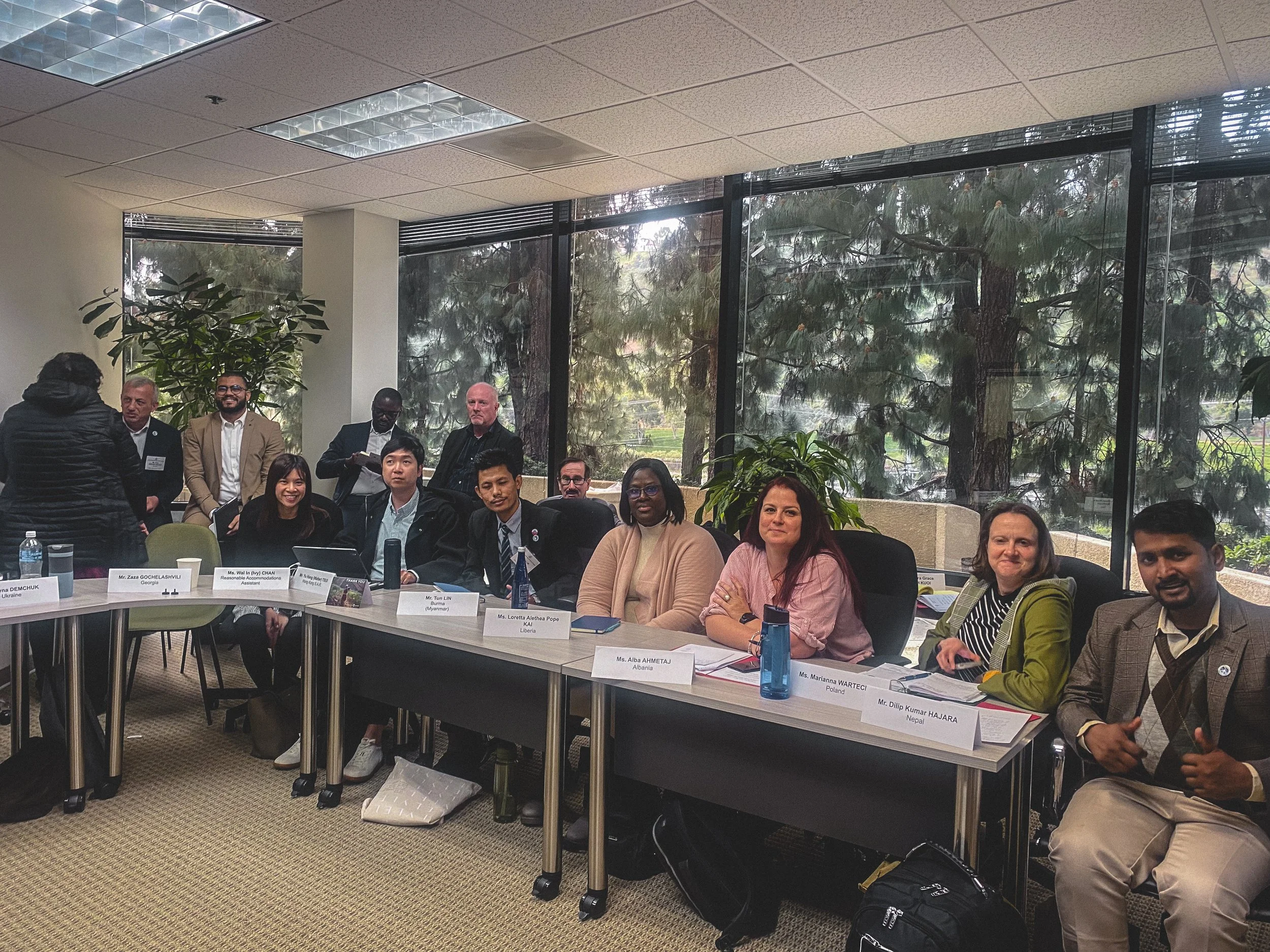I have a tendency to say yes to things before I’m totally aware of what I’m getting myself into.
When my organization got an email to its inquiries account asking if somebody would conduct a workshop for our local diplomacy council, I said yes.
It was only later that I received a meticulously organized 15 page document with the biographies of a couple dozen leaders from all over the world that I realized I committed to a rather large event. On top of having a large number of high profile people, I also discovered I would be giving a workshop on social media best practices. And that the workshop would span two and a half hours.
I raced ahead to the office that morning to try and get a jump start on setting up the place. Unfortunately, I wasn’t that successful at getting a jump start. Our attendees had arrived early as well. As I pulled up to the office, so too did a very large white bus. Out of the bus came a seemingly endless string of people, mostly dressed in suits and business attire, visibly from… everywhere. The mosaic of faces that came out of the bus really looked about as diverse of a group as you could ever assemble.
I welcomed the group and thanked them for coming.
“And a description of yourself?” he reminded me.
I knew this group put a strong effort towards accessibility and accommodating different needs, which is why about five of six people in the room were support persons to make things accessible. There was at least one visually impaired attendee.
“Could you tell the group what you look like?”
I realized there that this could also be a litmus test to see how delusional I was. If I went off and started saying standing before you is a tanned, athletic-built, bronze statue of a man. 6”2. Wearing an $800 fitted silk shirt, hinting at impressive upper body strength.
I resisted the temptation to embellish.
The diplomats introduced themselves, and I was impressed by the spread of countries. Botswana, Nepal, Poland, Angola, Samoa, Ukraine, Norway, Paraguay, Pakistan, India, Chile, Liberia, Egypt, Bulgaria, Georgia, Myanmar, Hong Kong, South Africa, among others.
The woman from Samoa was incredibly nice. She was working on reentry opportunities for people being released from prison. The woman from Poland worked with refugees who were staying in the country; she even brought me a thank you gift for having everybody. It was a colorful pair of socks with a design drawn by a refugee child. The guy from Pakistan was actually doing intense and important work with victims of sex trafficking and gender based violence.
Now to present to them on social media for the next couple hours.
I began my training on social media best practices. The idea came from them, but I spent years managing our organization’s account. In more recent years, we added a specialist who works a little more directly with posting and publishing, but I managed her and was still highly involved. I also had my own work as a creator.
I told people that social media management could be a full time job, and even a fully staffed department. If your team didn’t have the budget for it, or if you only had one person doing this work on top of other job responsibilities, then you probably shouldn’t compare yourself to organizations that have invested more. I shared what we were doing.
I realized that I was already 30 minutes into my presentation and most of my tips were to essentially temper their expectations. I felt like I was maybe being a de-motivational speaker. Every social-media-growth-hacking video comes out so high energy, like IF YOU’RE NOT USING THESE HOOKS, YOU’RE MISSING OUT ON GROWING YOUR PLATFORM! Meanwhile, I’m like, if it’s not for you, it’s not for you!
I also shared tips on how to take one piece of longer content and generate dozens of different posts from it, as a time-saver.
Then we got to the Q&A.
I got several good questions but it was one of the last ones that stood out to me most. The gentleman from Paraguay, who was the executive director of an environmental organization raised his hand and asked simply, “How do you deal with mean comments?”
The guy next to him from Nepal nodded along. I heard several people echo, “yes,” and the room seemed to collectively lean in. Everyone was listening extra attentively to this.
“Some people just want to watch the world burn,” expressed the man from Angola.
Wow, I thought to myself. I have this room full of dozens of diplomats… and the thing everyone wants to talk about the most is cyberbullying.
I guess it’s a problem, no matter where you live. No matter how high status you might be.
At the end of the day, despite the internet of things, we’re all just human beings trying to be loved. People who wake up hoping that a good day awaits us.
The representative from Egypt echoed his concern with a story. At a climate conference he organized, he served burgers for lunch, to the displeasure of an attendee. He was sympathetic and understood the concern, and offered falafel as a substitute. Even though he made things right in the moment, this attendee continued to pop up and berate the organization on all of their social media posts.
I’m fairly lucky in this area. I’ve grown my following to a pretty decent size while keeping the haters to a minimum, both for me personally and the organization. I think I have a few areas of privilege helping me out there, though. If I was female, I have no doubt that this would be higher.
The other day, I saw a video posted by a stranger of them making a mango horchata. This looked so good. I bookmarked it to save the recipe, intent on making it sometime. The highest visible comment was somebody arguing that she should have cooked the rice before steeping it, and all the replies to that set off debates about being really from Mexico and the right way to add rice to your horchata. The next comment was “what a waste of a perfectly good mango.” Like, if you just want to eat mango without horchata, go for it, ma’am. Nothing stopping you. But that’s not much of a recipe video. Why did you feel the need to drop by and say that?
I reminded everyone that 95% of the time it’s probably best to block and delete and move on. Your time and energy is too valuable, and is already needed elsewhere. That’s what I did in most scenarios. Sure, every now and then you actually stumble into a productive conversation that leads to better understanding. I’ve had it happen, but it’s rare, and you kinda got to develop the sense for it. Most of the time, people are posting away because it costs them nothing, and it gives them a chance to act in a way that you really can’t in the real world.
I block and delete, because the sooner you make their efforts futile, its more of their time wasted than yours.
I will admit, though, sometimes I peek at the profiles. And that almost always goes one of two ways.
One, you see an actual person. Maybe photos of them with their kids or dogs. And while their caption wasn’t them on best behavior, you start to see that maybe it came from somewhere. Maybe a stressed out human needed to let off steam. Maybe they should try pickleball instead of social media comments, but we’re all a work in progress.
Or you see a private account. Or one with three followers and no posts. This reminds me that this isn’t a person who is doing the work. Any work. This is a person- maybe a person, maybe a robot- that shows up just to be belligerent. They’re not contributing to anything in the world. Always a critic, never a creator. And that’s not somebody whose input you need to put too much stake in.
I’ll always remember the time I got to speak with dozens of diplomats from all over the world and the topic that got the most attention were mean comments on the internet. The people on the other end are simply humans trying to be loved.







